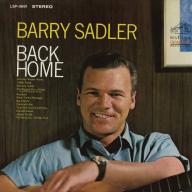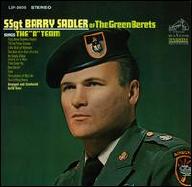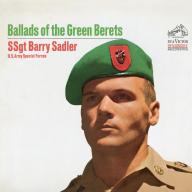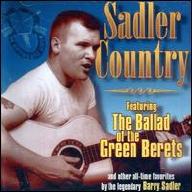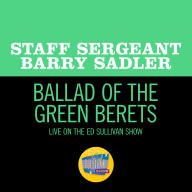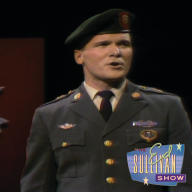Staff Sergeant Barry Allen Sadler was born in Carlsbad, NM, on November 1, 1940. His parents divorced when he was very young, and his father died of cancer when Sadler was just seven. His mother managed various restaurants and bars around the Southwest, moving the family wherever she could find work. Sadler first became interested in music at age 12, when he picked up a range of Western and Mexican songs at a logging camp, and began teaching himself guitar; during this period, he also discovered a talent for shooting, and developed a startling accuracy for his age. He quit school after tenth grade and hitchhiked around the country, and then enlisted in the Air Force in 1958. He spent a year in Japan working as an air traffic controller and radar specialist, and, unable to find a job after returning home, he traveled around the West with a friend, playing music at night while working whatever occasional odd jobs they could find. Frustrated, Sadler reenlisted, this time in the Army, and volunteered to become a paratrooper; impressed with his toughness, his instructors recommended him for Special Forces. Sadler earned his green beret and was trained as a medic and weapons expert; he served in several locations around the globe before being ordered to Saigon.
In 1965, while leading a patrol, Sadler was injured by a Vietnamese punji stick (sharpened bamboo covered with feces to increase the chances of infection). The infection did indeed set in, and Sadler nearly had to have his leg amputated. During his recuperation time, he sang and wrote songs for the other wounded soldiers in the hospital. One day, a TV news crew visiting the hospital filmed Sadler singing The Ballad of the Green Berets; when the song was aired back home, it became an instant sensation thanks to its themes of courage and achievement in the face of adversity. RCA quickly signed Sadler to a recording contract, and he recorded a full-length album, Ballads of the Green Berets, which was released in early 1966. Finally available as a single, The Ballad of the Green Berets was a monster seller, moving over two-million copies in its first five weeks of release; it spent five weeks at number one, winding up the number one single of 1966, and the album topped the charts as well. Sadler's unabashed, romanticized admiration for his fellow soldiers made him a symbol of American patriotism in a turbulent era, despite the fact that his songs didn't really make political or social statements. The Army ate him up, of course, and after several appearances on TV back home, Sadler joined the USO tour for awhile. He scored a minor hit with the follow-up single The A Team, and went on to release two more albums, 1967's Back Home and 1968's The A Team (which, oddly enough, didn't contain that song).
Unable to duplicate his success, Sadler lived in Tucson for a while and tried unsuccessfully to make it as a bar owner. In need of money (he'd donated a substantial chunk of his royalties to a fund for the families of Vietnam casualties), Sadler moved his family to Nashville and tried to reinvent himself as a straight country singer; he did record on occasion, but the material was only released posthumously as Sadler Country. In the mid-'70s, Sadler pled guilty to second-degree manslaughter after shooting a man who'd previously threatened him in a bar (on a dark street, he mistook the man's car keys for a gun). In the late '70s, Sadler became a surprisingly successful military/adventure novelist, creating a series of books (22 in all) based on the character of Casca the Eternal Mercenary (a Roman soldier who supposedly speared Christ on the cross, and was condemned to live until the Second Coming). In 1983, Sadler moved to Central America to train and supply the Nicaraguan Contras, and later settled in Guatemala City, where he sold weapons and transportation to the military. In 1988, while returning to his mountain ranch house in a taxicab, Sadler was shot through the head in a mysterious robbery or assassination attempt (his son Thor believed drug runners were after his cache of guns). Although he survived, Sadler suffered severe brain damage. He was flown back to Nashville by Soldier of Fortune magazine editor Bob Brown, and though he eventually recovered consciousness and speech, he remained in a hospital bed for the rest of his life. Sadler died of heart failure on November 5, 1989. ~ Steve Huey, Rovi


